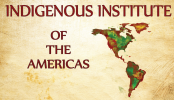Ask Uncle Gregory
For several years, the IIA has dedicated its efforts toward preserving cultural knowledge. In addition to our Mobile Educational Displays, cultural presentations/consultations, and our annual event Santa Fe Dayson the Chisholm Trail, we are utilizing digital preservation to bring elder knowledge to our younger generation.
Our Ask Uncle Gregory series came about b to help our committee and youth volunteers. learn about their own culture as well as to help others understand our worldview. We also want the broader community of educators, families, nonprofits, work environments, and students to also have direct access to this knowledge. Our culture is based on oral traditions i.e. storytelling. Today’s families expect to find accurate information on the internet by “googling” us or reading about us in books. Unfortunately, much of what we have found on the world wide web is presented through a Eurocentric view and does not reflect the nuances in our culture. We hope you enjoy these short videos and will take what is helpful toward building your understanding of our culture. Do you have a question we have not answered? Send it to us at Ask uncle Gregory videos
ASK UNCLE GREGORY SERIES EDUCATIONAL VIDEOS
*Our organization uses the term Native American Indian in an attempt to recognize and respect both those who prefer the use of the term Native American and those who prefer American Indian. Our organization’s President clearly prefers the use of our distinct tribal affiliations as our way of introduction such as Tsa-La-Gi, Dine’, etc. or Native people or Indigenous people. We hope that both the Ask Uncle Gregory video on this subject as well as this video of American Indian Movement activists Russell Means will help bring light to the history of these terms from a political and social perspective.
The following is a PBS article that discusses the view on Native terms from the perspective of the American Indian Movement.
In the 1960s, many people, both non-Indians as well as Indians, challenged the use of the word “Indian.” Some argued that it was a term coined by oppressors, and also a misnomer — they were not, after all, the Indians of the East Indies that Columbus thought he had met in the Caribbean. The critics argued further that over the centuries the word had gained a pejorative meaning, often conjuring up images that were simplistic, romanticized and often disparaging that were reinforced by TV serials and Hollywood westerns — think, for instance, of Tonto of the Lone Ranger series.
Is one more correct than the other … and why?
These cultural critics suggested substituting the term Native American for Indian. They maintained that Native American was also more accurate, as one meaning of native was “being the original inhabitants of a particular place,” as Native Americans were.
But despite the supposed political correctness of Native American, it has not become the preferred term. “The acceptance of Native American has not brought about the demise of Indian,” according to the fourth edition of the American Heritage Book of English Usage, published in 2000. “Unlike Negro, which was quickly stigmatized once black became preferred, Indian never fell out of favor with a large segment of the American population.”
Nor did the word Indian fall out of favor with the people it described. A 1995 Census Bureau survey that asked indigenous Americans their preferences for names (the last such survey done by the bureau) found that 49 percent preferred the term Indian, 37 percent Native American, and 3.6 percent “some other name.” About 5 percent expressed no preference.
Moreover, a large number of Indians actually strongly object to the term Native American for political reasons. In his 1998 essay “I Am An American Indian, Not a Native American!”, Russell Means, a Lakota activist and a founder of the American Indian Movement (AIM), stated unequivocally, “I abhor the term ‘Native American.'” He continues:
It is a generic government term used to describe all the indigenous prisoners of the United States. These are the American Samoans, the Micronesians, the Aleuts, the original Hawaiians, and the erroneously termed Eskimos, who are actually Upiks and Inupiaqs. And, of course, the American Indian.
I prefer the term American Indian because I know its origins. … As an added distinction the American Indian is the only ethnic group in the United States with the American before our ethnicity.
